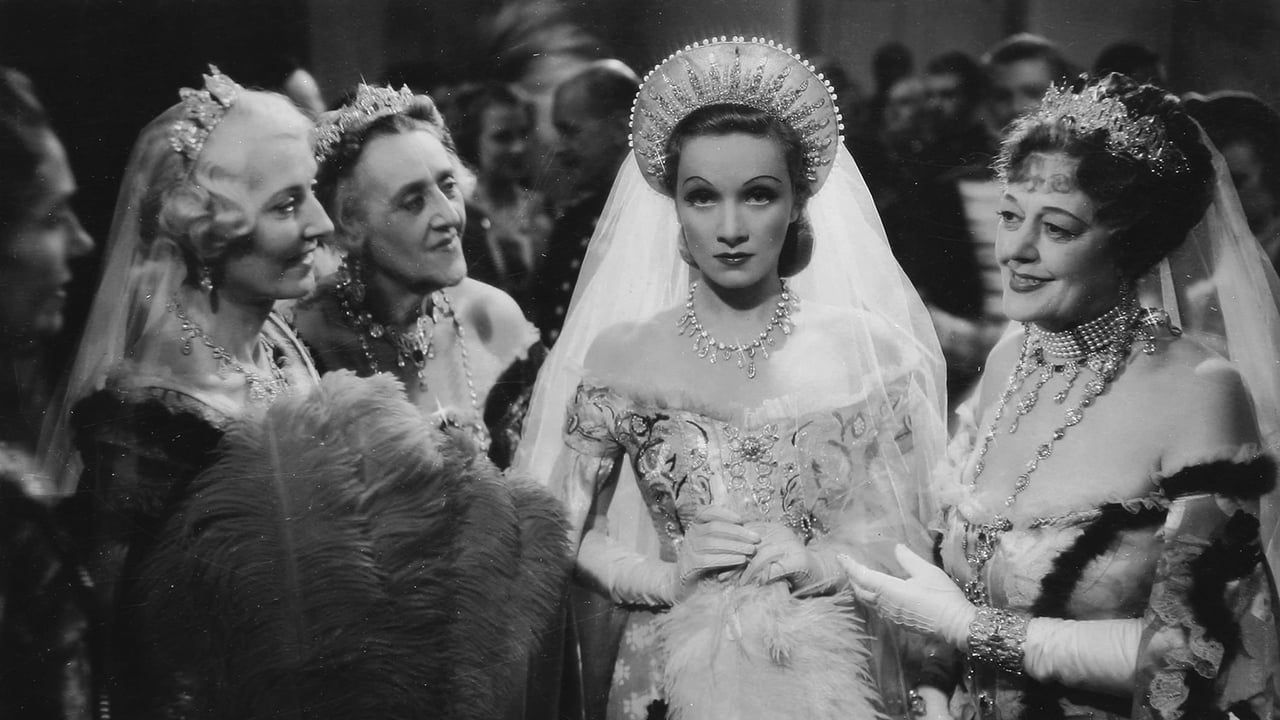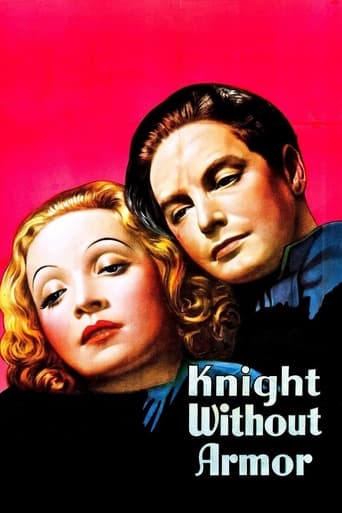

brilliant actors, brilliant editing
... View Morea film so unique, intoxicating and bizarre that it not only demands another viewing, but is also forgivable as a satirical comedy where the jokes eventually take the back seat.
... View MoreThe acting is good, and the firecracker script has some excellent ideas.
... View MoreIt is interesting even when nothing much happens, which is for most of its 3-hour running time. Read full review
... View MoreThis is a pretty crazy old movie, which used to appear regularly on television in the late 1950's.It would be easy to make fun of the overwrought plotting in the film and the rather chirpy, "Boy's Owns" performance of Robert Donat as A. J. Fothergill, which sees him stiff upper lipping his way through labour camps, mass migrations and firing squads. However the film has its moments and although shot entirely in pre WW2 Britain, it captures a sense of the chaos and dislocation of the Russian Revolution.A. J. Fothergill, an English Journalist in Russia, ends up working for the British Secret Service at the outbreak of the revolution. Posing as a Bolshevik he falls in love with Russian aristocrat Alexandra Adraxine (Marlene Dietrich) who is fleeing for her life. As they head to safety they encounter characters on both sides of the civil war: reds and whites.It is in the subplots where the film captures a sense of a world turned upside down. The couple meet people unable to grasp the new role history has trust on them; the deranged station master announcing the arrival of non-existent trains or the commissar who falls for Marlene's character at first sight.If ever a film captured the mystique of Marlene Dietrich it is this one. In every scene, whether in full regal glory at a ball, trudging through the mud or snow, even dressed as a man, key lighting accentuates those cheekbones and casts the little butterfly shadow under her nose. She glows in every scene.The British tone to the whole thing takes some of getting used to and is more obvious than in Lean's "Doctor Zhivago" where the cultural transplanting is subtler. In both films, an intense love story plays out against the same turbulent historical backdrop."Knight" views the communists and the anti-communists in equally grim terms with summary executions all over the place. The rattle of the machine guns used in the executions is a motif throughout the film.It's a bit creaky nowadays, and is unlikely to be on anyone's top ten, however "Knight Without Armour" has an indefinable mood, and a couple of scenes that stay in the memory.
... View MoreCasting Marlene Dietrich (a coup achieved only after Donat's own two preferred actresses proved unavailable -- he was supposed to have the right of veto on the leading lady) may have been a publicity coup for Alexander Korda, but to be honest I'm not sure it did the film any favours.With Dietrich on board and then Donat so ill the start of the film had to be shot around him, the part of the Russian Countess was massively pumped-up, causing the running time to go seriously over-length. Supposedly about two hours of material then had to be cut out, a process which is most evident towards the beginning of the film where passing time is skated over very unevenly.Secondly, scenes featuring Dietrich have a tendency to feature long, loving close-ups of her face at the expense of pacing, plausibility (her make-up never falters) and acting -- Donat's own close-ups are reaction shots in which we see a shadow of significant emotion or realisation, but Dietrich's might as well be promotional stills for all the expression she gets to demonstrate. (Ironically she also comes across as too worldly and sophisticated for the part, certainly in the opening scenes: I had her pegged as an unmarried daughter/companion in her twenties from her racetrack appearance, and was jolted to subsequently find that the character was supposed to be a teenage débutante!) Dietrich was far better in her earlier Russian role of "The Scarlet Empress", Catherine the Great: here she is little more than a doll to be pushed around and emerge in an improbable china glow.It is perhaps because of this that I can't see any real chemistry between the two characters: Donat shows chivalry and protectiveness throughout, but his subsequent protestations of love (and her requisite responses) felt to me very arbitrary and artificial. A sudden excess of calling one another 'darling' and kissing are not the same thing as demonstrating any actual feeling between the characters, unfortunately, and the script feels forced in this respect.Where the film does shine -- or at least engross - is in its depiction of the scrambling post-revolutionary war of brutality and counter-brutality, and the hordes of hapless refugees caught up between the two. There are a lot of executions in this film; then just when the audience is keyed up for another, the hero makes his escape (courtesy of an unexpectedly schoolboy knockdown blow) and the others scheduled for execution take advantage of the confusion to attempt to turn the tables. Subconsciously I suppose we expect a morally uplifting outcome, which makes the brutal bayoneting that follows all the more shocking.As others have said, the scene where the Countess wakes up to find her entire house deserted -- save for one peasant woman at the riverside who flees at the sight of her -- is a powerful one, as is the moment when she faces down the mob... unsuccessfully. I did find the big reveal of the line of soldiers suddenly coming over the brow all around the horizon to be a little too cinematic for its own good, though: shades of Westerns throughout the ages, in a scene that's more "Tale of Two Cities". (My other problem with this scene is that, again, Dietrich displays almost no emotion of any kind and just stands there in soft-focus looking blankly beautiful.) Sections of this film are very good, but they are mostly not the sections featuring the character of the Countess; and certainly not those using her as a glamour object, which tend to be rather banal. I can't help suspecting that what I'm seeing is the bones of the original novel showing through the star overlay.
... View MoreMost people never have heard of Bruce Lockhart. He was (with Sidney Reilly) one of the two best British Agents in Russia at the time of the Bolshevik Revolution in 1917. Reilly (whose life was the basis of a BBC series about twenty years ago called REILLY: ACE OF SPIES) died in Russia - either having been executed or (more likely) willing to become an agent of the Soviet Secret Police. Lockhart stayed in Russia until the early 1920s, when (in a remarkable series of close calls) he escaped through Central Asia into India and returned home. His memoirs were eventually published.Lockhart's career is the basis of James Hilton's character A. J. Fothergill / Peter Ouragoff (Robert Donat) in the novel KNIGHT WITHOUT ARMOUR. Not totally, of course. Lockhart did not end his life with an ex-Russian countess as his wife (Marlene Dietrich here, as Countess Alexandra Vladinoff). But the general tone of Lockhart's career in Russia is there. Also the support Lockhart (and most western governments) tended to give the White Russians who were anti-Bolshevik.The story is Hilton's Russian Revolution novel. As such it tends to the anti - Bolshevik line that the West took, with Dietrich one of the persecuted ex-aristocrats who are in danger of being shot by the new rulers of Russia. To the credit of the screenplay some of the White Russian brutality is shown, but the edge of the story looks at the Bolsheviks as evil incarnate, except for John Clements who finds that rescuing Dietrich at one point is just too much for his own twisted standards. The film is a good one, but somehow the action is too jumpy - in particular the initial stages of the story which goes from 1910 to 1917 to quickly. We know that Dietrich is widowed by the war, but we never learn what happened to her husband (presumably killed in battle). Some of the later events are speed-ed up, and the conclusion we assume is happy, as Donat jumps out of the temporary restraints on his own person, and apparently jumps successfully onto Dietrich's train to be reunited with her.But the best moment of the film is shared with another actor - Hay Petrie as a station master. It was the scene that stood out above all others to Graham Greene, at that time a movie critic for a London newspaper. Greene enjoyed this weird scene where Donat and Dietrich are fleeing and find railway tracks and a little, undisturbed station. They enter and go to the ticket office, but can't find anyone. Then Petrie turns up and says that they'll have to purchase their tickets on the next train. He tells them it will be there in fifteen minutes. They sit down and hope the train will take them away from their Bolshevik pursuers. They converse about their situation and plans. Then Petrie returns and tells them to get ready - the train is coming. They go out on the platform and don't see any sign of any train in either direction. Petrie comes out waiving a broken lantern and announcing the arrival of the next train, and the horrified couple realize they've been dealing with a madman. Greene was right: it was the moment of the film that remains most firmly in one's memory.
... View MoreI would see this movie again and again just to look at Robert Donat and hear that lovely voice of his, although I must agree that Marlene Dietrich isn't bad either. She manages to get herself into some stunning gowns and looks none the worse for being overthrown by a group of bitter peasants. (That's always the problem with her movies.) Knight Without Armor is a wonderful film of its era, full of charm and with some unexpected allusions to what we must assume (in fact, know) was a very successful sexual encounter in a scene just dripping with double entendre. The film is an interesting and more or less ambiguous view of the Russian Revolution. The chemistry between the two actors works very well--and Donat truly is a knight without armor. It's a shame that he was in so few films--he was such a remarkable and beautiful presence on the screen.
... View More